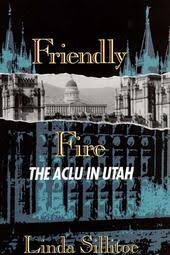Articles/Essays – Volume 31, No. 3
Issues of Individual Freedoms | Linda Sillitoe, Friendly Fire: The ACLU in Utah
At first, the title of this book seems a bit misleading and confusing. “Friendly fire” became popular during the Gulf War as a description of how American troops were killed by their comrades during desert skirmishes. However, a reading of this volume illuminates the reality that Utah society does have the capacity to destroy some of its own citizens through discrimination and denial of civil rights.
Linda Sillitoe has chronicled the Utah chapter of the American Civil Liberties Union’s brief history through a focus on leaders, lawyers, and court cases. As a journalist, Sillitoe emphasizes particular individuals and cases that brought considerable attention to the ACLU. Although she discusses numerous First Amendment cases as well as prisoners’ rights and discrimination issues, her greater contribution is to show how the ACLU champions the issues that make democracy work.
Utah is particularly unfriendly turf for the ACLU and its causes. The organization is often targeted as the “anti-Christ” that only cares about prisoners, homosexuals, radicals, and religious dissenters. In fact, some blamed the ACLU for the destruction of family values by their attacks on public prayer, use of religious facilities for public meetings, and challenging Utah’s cable decency act. At the core of the conflict are the two century-long constitutional battles concerning the protection of the minority from a heavy-handed majority will.
The volume chronicles leadership as well as issues. The author has a tendency to idolize the skeleton staff which chose to champion civil liber ties issues on the Utah stage. The executive directors, who also serve as spokespersons for the organization, are publicly viewed by most Utahns as evil outsiders sent by the devil to destroy traditional religious values. Consequently, Stephen W. Cook, Shirley Pedler, Robyn Blummer, and Michele Parish move throughout the headlines but ultimately take their battle to other states. In retrospect, they are courageous individuals who chose to sacrifice personal goals and ambitions for the cause of civil liberties.
At times, a reader may wish for more in-depth analysis and consequence. A good example is the Logan, Utah, case relative to counting LDS seminary credit in non-sectarian classes, Old and New Testament, toward graduation. The students and parents who challenged this forty year-old tradition suffered consider able pressure and some ostracism. Al though the ACLU technically lost the battle because the court compromised by allowing other religions to offer classes adjacent to the Logan High School campus, in reality the ACLU won the war because the eventual fall out was that school districts eventually chose to stop accepting religious cred its. The ACLU goal of separation of church and state was achieved, and Utah’s universities and colleges chose to no longer accept LDS institute credit as elective hours. The institutes and seminaries survived, but the principle of First Amendment protection also received enhancement.
The volume obviously offers a pro-ACLU posture and that is not troublesome. What is a problem is that the author and editor(s) made errors in spelling individuals names such as Victor Cline not Klein (30), the famous University of Utah psychologist, and Jack Scherting not Sherting (52), the Utah State University English professor. Frank Pignanelli’s name (234) is also on the list of those incorrectly spelled. The Democratic legislator is significant as a voice of reason. Finally, the infamous Madalyn Murray O’Hare is identified as O’Hair (116) in a quoted article. The author and editor(s) needed to correct these mistakes. The author even identified William Nelson as a “recently-ordained” apostle (177), whereas Nelson is not a general authority but chairs a watchdog committee “To Strengthen the Members.” These oversights illustrate two funda mental problems with current publishing. In the first place, spell check is wonderful unless proper names are involved and editors fail to check against other sources. Second, newspapers are unreliable as primary sources because of the journalistic demand for speed. Editors and authors must make sure that proper names are presented correctly. There also needs to be a consistency in both the text and index relative to formal and informal presentation of names. Utah is most aware of all general authorities initials and they are presented formally, while other significant players such as Congress man Bill Orton and Wayne Owens are both without initials and in the case of Orton, or Bud Scruggs, his formal name.
However, this is an excellent sur vey of a very significant aspect of Utah’s recent past. The author is most perceptive in seeing the large picture and keeping the reader focused on the issues of individual freedoms. She also has interviewed extensively and brought to light the role LDS leaders play in the numerous battles for civil liberties. Indeed, she describes recent cooperative efforts as a tremendous step forward on the part of the ACLU and the LDS church. The volume is a major contribution to Utah history and deserves to be thoughtfully considered.
Friendly Fire: The ACLU in Utah. By Linda Sillitoe (Salt Lake City: Signature Books, 1997).


 Back to full Issue
Back to full Issue

